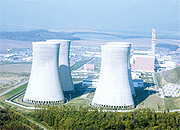Following Spain, Sweden and Finland, Europe now confirms yet another decision for the use of nuclear energy. Germany has in fact decided to prolong the activity of its 17 power stations. According to German Chancellor Angela Merkel, this means “a revolution” extending the operative cycle of the oldest plants (those constructed before 1980) and of those more recently active, to 8 years. This way the power stations will proceed with their activities until at least 2032, continuing to respond to approximately 32% of national energy demand.
For Berlin this will mean a big change after the previous decision - made by the old government lead by Gerhard Schroeder - to say adios to nuclear energy. This choice will involve a redefinition of the balance of relationships between Länder and the central government. A utility tax for the sector, which will also be used to finance the fund for renewable energy development, can also be expected. In the upcoming months, an outline of the conditions and timing necessary for investments guaranteeing the prolonging of the plants will be drawn up. Among the needs that emerged in the debate which lead to the decision announced by Merkel, there is in fact an rise in safety standards, in order for German plants to reach levels equal to those offered by the third generation power plants.
The decision to lengthen the life of German reactors follows similar choices recently made in Sweden, Spain and Finland. In 2010, the Parliament in Stockholm decided to construct a new power station, confirming the inversion of broken sanctions in 2009 with the appeal to ban the construction of plants and renew reactor parks. In addition, Madrid has recently extended the activity license for its reactors until at least 2020. On this note, Zapatero government retraced its steps, after having announced the in the past that they would no longer use the nuclear chain for the increase of investments in the new renewable sources._
The guideline for nuclear energy, that has emerged based on decisions of the constantly growing number of European countries in support of it, is motivated by an arrangement of elements which are characteristic of the nuclear chain.
On one side, it is necessary to ensure one decisive source in order to guarantee a balanced mix of energy in the country, on the other there is the knowledge that renewables alone cannot respond to the electricity demand of a country, and they still pay a high deficit for the cost-profit binomial.
In addition to these factors, it is also necessary to maintain the activity of plants that contribute significantly to the fight against climate changing gases, the objective, which is constantly gaining urgency in view of the 2020 European Union Conference and the future political developments against climate change.
In short, the European governments’ decision presents itself as a recognition of the contribution that the nuclear division will bring to the United States economy. The country’s system, both with regards to the price of energy as well as with concern for the industry that it generates, will draw benefits from the presence of power stations that will construct a volcano of development, investments and employment opportunities.
08 Февраля 2026 | воскресенье | 15:43


